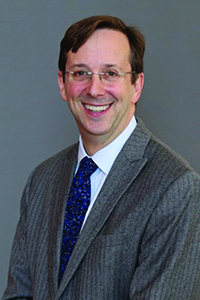
Brown University’s Leigh Hochberg, along with Harvard’s Conor Walsh and Massachusetts General Hospital’s Sabrina Paganoni, have been awarded the Cullen Education and Research Fund (CERF) Medical Engineering Prize. The prize is accompanied by €500,000. The BrainGate+SoftRobotics collaborative research team is creating a series of technologies intended to improve arm and hand function for people with muscle weakness and paralysis, including people with amyotrophic lateral sclerosis (ALS).
ALS, also known as Motor Neuron Disease (MND) or Lou Gehrig’s Disease, leads to the injury and loss of neurons in the brain and spinal cord, leading to paralysis. The CERF Medical Engineering Prize was established to recognize outstanding research and to encourage the development of technologies that maintain or restore function of the arm and hand for people with ALS/MND.
“We are delighted to announce the BrainGate+SoftRobotics team as the winner of this year’s CERF Engineering Prize,” said Hazel Cullen, manager of the CERF prize. “This important and groundbreaking work will change the lives of those living with ALS by giving them back some of the independence that is taken away by this awful disease.”
 The winning team is working together to create wearable soft robotics that maintain the function of the arm and hand, and can be controlled entirely by a person’s intention to move. The soft robotic system, already in development, can detect subtle movements – for example, the partial flexion of an index finger – and pneumatically actuate a glove that quietly and smoothly completes the closing of the hand to grasp a coffee cup. The research team is working to combine the soft robotic technology with the investigational BrainGate system, a tiny array of electrodes that can sense and decode signals from the brain’s motor cortex. The team aims to use signals from the brain to drive the soft robotics, restoring people’s ability to reach and grasp.
The winning team is working together to create wearable soft robotics that maintain the function of the arm and hand, and can be controlled entirely by a person’s intention to move. The soft robotic system, already in development, can detect subtle movements – for example, the partial flexion of an index finger – and pneumatically actuate a glove that quietly and smoothly completes the closing of the hand to grasp a coffee cup. The research team is working to combine the soft robotic technology with the investigational BrainGate system, a tiny array of electrodes that can sense and decode signals from the brain’s motor cortex. The team aims to use signals from the brain to drive the soft robotics, restoring people’s ability to reach and grasp.
“On behalf of our BrainGate team, I’m so grateful to the Cullen Family for their visionary and engaged support of research to help people with ALS,” said Hochberg. “Brain-computer interfaces, including the system being developed by our BrainGate consortium, hold tremendous potential to restore communication and mobility for people with paralysis. Together with Conor and his incredible lab, we are working every day to, quite literally, turn thought into action.”
Hochberg is a critical care and vascular neurologist and Director of the MGH Center for Neurotechnology and Neurorecovery; Professor of Engineering in the School of Engineering and Carney Institute for Brain Science at Brown University; Director of the Dept. of Veterans Affairs Rehabilitation Research and Development Center for Neurorestoration and Neurotechnology in Providence, RI; and Senior Lecturer on Neurology at Harvard Medical School. He also directs the BrainGate clinical trials, conducted by a team of clinical and basic neuroscience and neuroengineering researchers from across the nation.
“We received an exceptional number of excellent entries for this our first Medical Engineering prize,” David T. Cullen, chairman and founder of CERF, said. “The combined entry from the Brown and Harvard Universities and MGH utilized innovative fresh thinking, using highly advanced technologies. ”
[Editor's note: CAUTION: Investigational Device. Limited by Federal Law to Investigational Use.]